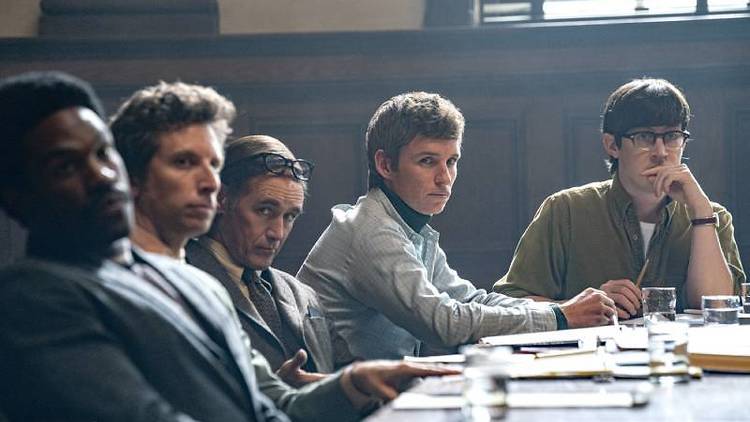Even by this year’s standards, 1968 was a grim 12 months in American life. As the body count racked up in Vietnam, so it did on US soil. Martin Luther King and Bobby Kennedy met their end at the hands of gunmen; tensions between left and right boiled over from the Senate to the streets; and a culture war blazed – even without the help of social media. Somehow, Aaron Sorkin crams all that tumult and complexity into a ferociously articulate courtroom drama that zeroes in on a specific yet hugely emblematic moment and plays it out with stirring passion and quickfire dialogue.
The Chicago Seven of the title are a group of anti-war protestors blamed for rioting outside the 1968 Democratic National Convention and put in the dock. As per the real events to which the film sticks faithfully, they’re actually eight for the bulk of the runtime. Black Panthers co-founder Bobby Seale (Watchmen’s Yahya Abdul-Mateen II) is also indicted on the most circumstantial evidence. The suspicion is voiced at one point that he’s there mainly ‘to frighten the jury’. By the time the trial gets underway it’s 1969, Nixon is in power and the system is reasserting itself via any oppressive means at its disposal.
Context is provided via a rollicking opening that takes in the film’s chunky ensemble of characters. The device is meant to distract from the volume of info that you’re receiving – and like most of the movie’s many lighter moments, it works a treat. The protests are tackled later in flashback, recreated in all their confusion and violent intensity as exhibits during the trial.
While Sorkin the director gives all eight defendants screen time, Sorkin the screenwriter wisely divides the meat of the film between just four: moderate activist Tom Hayden (Eddie Redmayne), radical firebrands Jerry Rubin (Jeremy Strong) and Abbie Hoffman (Sacha Baron Cohen) and the outraged Seale. Trying to forge a coherent defence out of this disparate band is Mark Rylance’s civil rights lawyer (though the lawyerless Seale takes whispered courtroom advice from fellow Panther, Fred Hampton – played by Waves’ Kelvin Harrison Jr). Ranged against them are Joseph Gordon-Levitt’s ambitious young prosecutor and an ultra partisan judge who dishes out contempt charges like confetti. A terrific Frank Langella plays him with the snobby hauteur of your least favourite maths teacher.
Initially, there’s a whiff of miscasting in the air. Strong’s Jerry Rubin and Sacha Baron Cohen’s Abbie Hoffman stride into frame for the first time – one with an offbeat Midwestern twang, the other sporting a curly hairpiece – it’s all a bit ‘Cheech and Chong Go to Court’. But it’s a false impression. Strong shakes off his clenched Succession persona with a zonked-out charm and unexpectedly evolves into the film’s heart. Baron Cohen is flat-out great, flexing his dramatic muscles without losing his comic edge. His climactic scene with Redmayne is rocket-fuelled. Redmayne, meanwhile, delivers the film’s showstopping moment at the end of a nicely dialed-back performance.
Sorkin is in equally unshowy form. As you’d expect from the man behind The West Wing and The Social Network, he delivers the odd zinger (‘This is the Academy Awards of protestors,’ notes one defendant, ‘and it’s an honor just to be nominated’). Mostly, though, he lets the story speak for itself, focusing on the key moments from the six-month trial and keeping things pacy with fluid camera moves and smart edits.
Not everything lands. A subplot between a female cop who lures a lovestruck Rubin into a honeytrap elbows in on the film’s solemn climax, and Sorkin struggles to make space for well-developed female characters. But when it all clicks, its terrific cast in full flow in that packed courtroom, it’s truly stirring stuff.
Streaming globally on Netflix from Oct 16.

